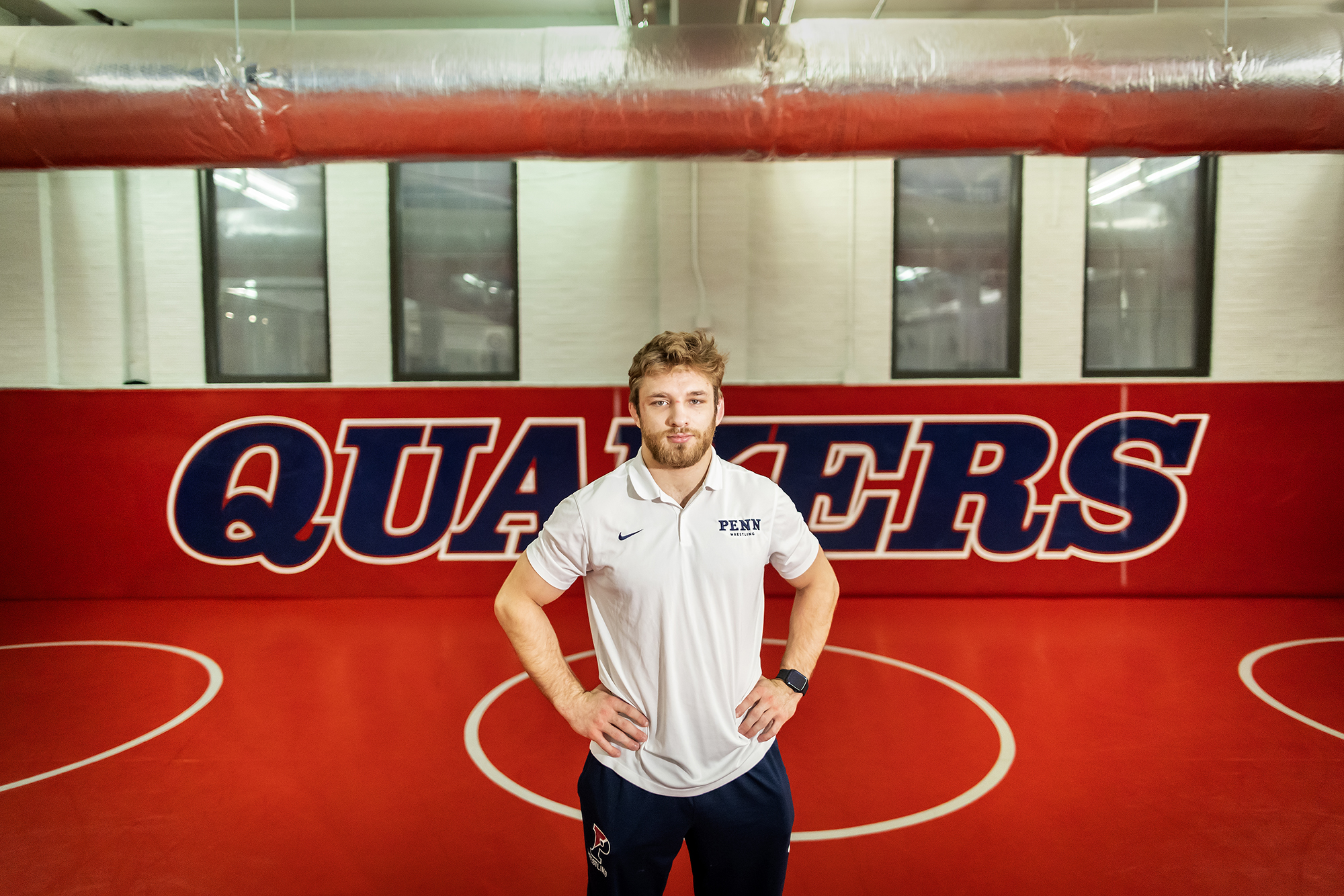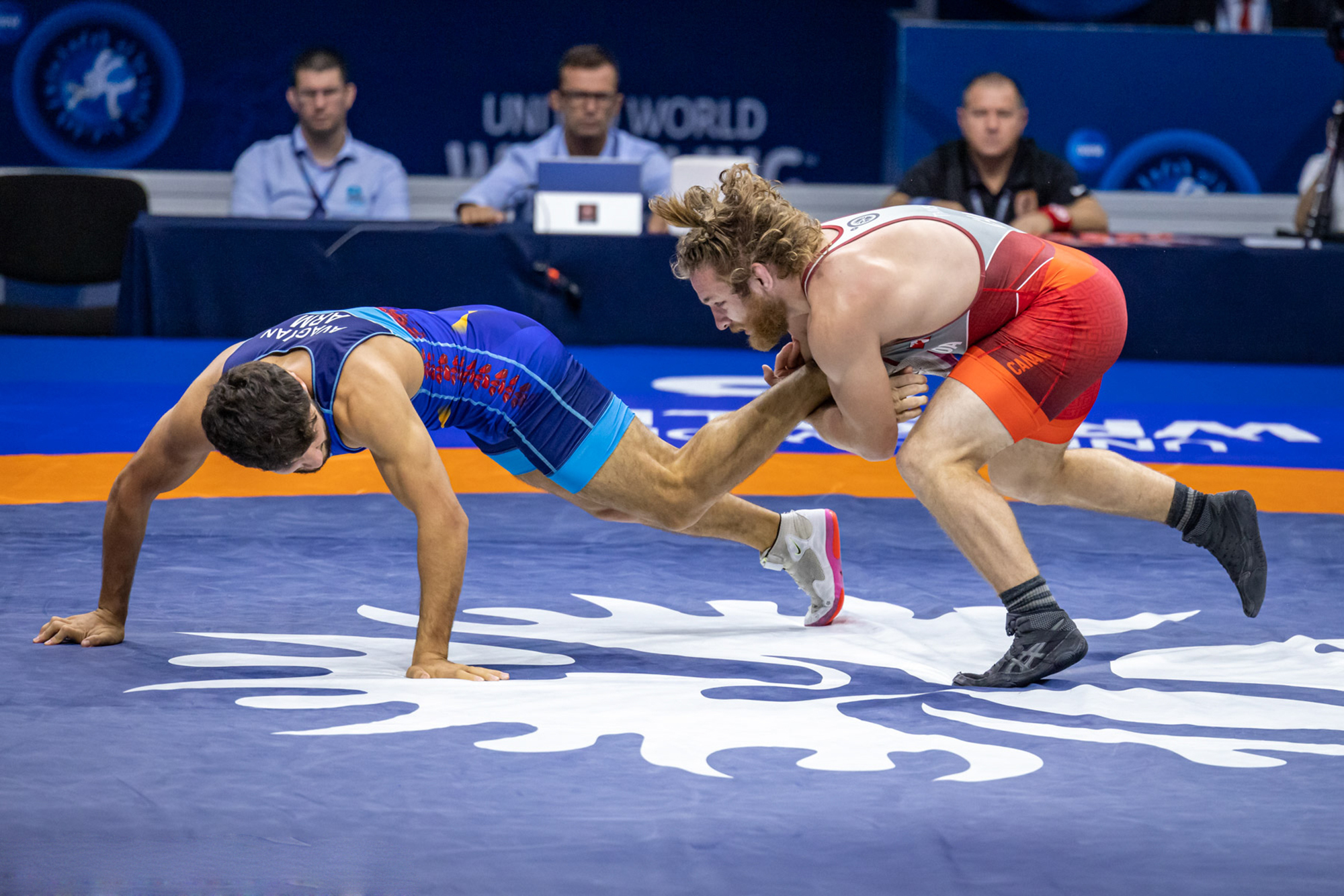
Olympic hopeful Adam Thomson’s unconventional path to Penn came from his prowess on the wrestling mat and has since led the second-year Penn student to academic research opportunities, which he’s managed to juggle, along with schoolwork, despite international championships that take him all over the globe.
Thomson, from Calgary, Alberta, didn’t take the traditional route from high school to college. Instead, he embarked on a two-year mission trip with faith-based charity Mercy for Youth Ministries, where he traveled around the East Coast of the United States and Canada helping disadvantaged Indigenous Canadian children in a sports environment. After the mission work wrapped up, he was looking for places to continue to train as a wrestler. One of his coaches in Canada recommended Penn’s Olympic Regional Training Center as a good place to start.
“I knew that I wanted to come to school in the United States because wrestling is more competitive here, but I also had some academic goals that I wanted to meet. Penn seemed like a fantastic place for that,” says Thomson, who is majoring in computer science in the School of Engineering and Applied Science. “The strong tradition of wrestling here was really attractive and also the values behind the program. I felt like here I’d become a good wrestler and I’d become a good student, but it would also help me become a good person. And that was really important.”
In March 2023, Thomson won the Canadian Nationals and was able to represent Canada at the World Championships in Belgrade, Serbia, and the Pan Am Games in Santiago, Chile. He competed for Canada again last month at the Pan Am Championships in Acapulco, Mexico. He’s currently an alternate for Team Canada at this summer’s Olympic games in Paris and says he hopes to represent Canada in the 2028 summer Olympics in Los Angeles. He’ll participate in the Canadian National Championships March 14-17, and this summer he’s in major tournaments in Spain, Italy, and Hungary.
Balancing schoolwork and sports can be challenging for college athletes, and mixing in a lot of international travel makes it seem extra tricky. So how does Thomson manage to balance it all?
“The coaches have been very flexible, my professors have been very flexible and there’s a lot of resources here at Penn for any help you need,” he says. “Time management is key, and so is asking for help when you need it.”
Taking a detour through Brazil
Thomson is majoring in computer science and intends to focus on machine learning. “The idea of giving a computer a ton of data and saying, ‘OK, look for some connections here’ is really fascinating. It sometimes produces results that you wouldn’t expect and sometimes exposes some human blind spots,” he says.
During his first spring semester in 2023, Thomson decided to explore classes outside his major and took a history class with Melissa Teixeira, a historian of modern Brazil with an interest in legal history and the history of economic life. The course, Inflationary Times: Money, Currency, and Debt in History, was a Benjamin Franklin Scholars seminar, which are classes intended to help students broaden their knowledge outside their school and major.
“We were living through inflationary times, and I didn’t know much about monetary policy, and I was interested in learning more about the subject,” he says.
Teixeira says she appreciated that as a first-year student Thomson was eager and willing to sign up for an advanced seminar that required quite a bit of reading and a research project.
“He wrote a final project on hyperinflation in Hungary in the 1920s,” Teixeira says. “He did a wonderful job finding interesting sources on the economic crisis and offered very insightful analysis into the causes and remedies of hyperinflation, paying attention to some of the unintended consequences of the measures used to bring down inflation.”
Thomson knew he wanted to do research during his time at Penn and was pointed to the Penn Undergraduate Research Mentoring Program (PURM) by some of his teammates. Scrolling through the list of projects, Thomson saw Teixeira was looking for help last summer on a project on hyperinflation in Brazil in the 1980s and 1990s.
“I saw her name and thought, ‘Oh, this is perfect!’” he says. Teixeira felt the same way. “Given the solid work he had done for the course and his curiosity about the topic, I knew he’d do a great job,” she says.
Teixeira is working on a book that explores economic policymaking in post-1945 Brazil and how they dealt with chronic inflation. “I’m also looking at the ways in which ordinary citizens navigated this context of constant price instability with the persistent erosion of their purchasing power, especially as the situation turned so dire that the annual inflation rate reached nearly 3,000% in the early 1990s,” she says.
The topic intrigued Thomson, who has traveled to South America with wrestling.
“I’ve been fortunate enough to do a fair share of traveling and that has really helped me expand my world view,” he says. “It’s very easy to fall into a very North American-centric way of looking at things. So, the Brazilian aspect of this project was really interesting to me.”
PURM research opportunities are offered through the Center for Undergraduate Research and Fellowships. The program provides rising second -or third-years at Penn a chance to spend 10 weeks working with Penn faculty, along with a $5,000 award for the summer.
Thomson says the skills he has developed as a wrestler helped him out during the course of the project. He doesn’t speak Portuguese and occasionally had a hard time finding sources that were reliable in English. So, he had to find people who spoke Portuguese to help him and check that the translation was accurate.
“It took a little bit of time for me to parse through some of the jargon. That’s where the tenacity that comes from wrestling comes in,” he says. “If you have some adversity or you come up against an obstacle, you can’t really feel too bad about it for very long; you move on and try and find a solution.”
His biggest takeaway from the research was how often the experiences of everyday people can get overlooked when studying big historical events or past economic trends. “It’s really easy to just allude to it in numbers and graphs. But our research was more focused on the day-to-day lives of people who were affected by hyperinflation. Those real, tangible effects on everyday people can get lost. I have a much greater appreciation for that now.”
Unconventional path, promising future
Bryan Pearsall, Joshua J. Harris Associate Head Coach, says Thomson’s unconventional path to Penn is one of the reasons he’s a standout. He remembers when Thomson was training at the Olympic Regional Training Center and brought in his transcripts and test scores to show the coaches.
“He said he wanted to go to university here, and we saw his academic materials were very strong. It was a non-typical recruitment for us because he kind of fell into our lap, and he was several years beyond high school graduation,” Pearsall says. “He does bring so much into the room. He’s such a tremendous young man, so polite, so hard working. He’s always one of the first people to raise his hand to volunteer for a task that needs to be done.”
Pearsall says Thomson’s mission trip and the fact that he started college as a 22-year-old “brings a different level of maturity, both mentally and physically, than many of his peers. It’s almost like he had a head start.”
Pearsall knows Thomson handles his academics as diligently as his wrestling.
“None of our other wrestlers are going to one country this week and then another country next week; he’s traveling a lot more than almost any student athlete at Penn,” Pearsall. says “He’s handling it very well and continues to get very strong grades. The engineering program here is rigorous, so to be balancing all these things and performing at a high level in all of them is a testament to him. We’re very proud of him.”
Teixeira knew Thomson had a grueling summer schedule of competitions for wrestling which took him all over the world as they worked on the project.
“He was able to balance his responsibilities as an athlete with his research commitments. His multitasking is tremendously impressive,” she says. “He has great insights on economic history and its importance for understanding our economy today. He asks great questions. He is energetic, hardworking, and optimistic about the work he does. I can see these traits being strengths that he brings both to his wrestling and to his academic pursuits.”








